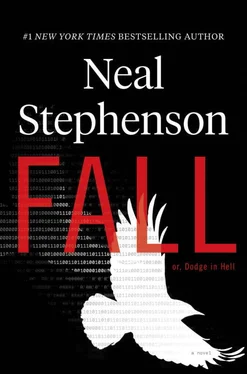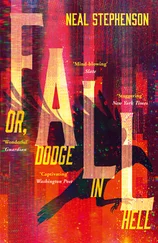The music of Pompitus Bombasticus made Richard’s fifteen-minute bus ride seem as inspiring and yet tragic as the Battle of Stalingrad. As the vehicle swung around a corner downtown, it was halted by a man holding up a stop sign as a long truck full of dirt pulled out into the street, bound for wherever excess dirt was dumped. The soundtrack in Richard’s headphones made this labored but basically simple operation seem as much a technological miracle as the departure of a massive yet graceful starship from its orbiting dry dock. It was taking Dodge a few moments to get his bearings. He realized that an older skyscraper—a building that had helped to define the city’s skyline since the 1960s—had been obliterated while Richard’s attention had been elsewhere. A rendering on a sign depicted a much taller building that was going to replace it. Fogeyish as this was, he felt somehow let down and scandalized. You take your eye off the ball for a minute and a building’s gone.
But in the very next block was a building that had been a celebrated architectural happening when it had gone up, what, five, no, ten years ago. Now it was just part of the landscape. It occurred to him to wonder whether he would still be alive when it was torn down. For that matter, he had been known to wonder whether his current car was going to be the last car he would ever buy, whether the leather jacket he was wearing now was going to outlive him. He was not being morbid. He was not depressed, not thinking about death overmuch. He just assumed that he was on a very long glide path leading to death in perhaps another thirty to fifty years and that he had plenty of leisure in the meantime to ponder it. He saw life as a trench in the First World War sense of that term, dug very deep at one end but becoming more shallow as you marched along, gradually ramping up to surface level. Early in your life you were so deep down in it that you didn’t even know that shells were bursting and bullets zipping over its top. As time went on these became noticeable but not directly relevant. At a certain point you began to see people around you getting injured or even killed by stray bits of shrapnel, but even if they were good friends of yours, you knew, in your grief and shock, that they were statistical aberrations. The more you kept marching, however, the more difficult it became to ignore the fact that you were drawing close to the surface. People in front of you died singly, then in clusters, then in swathes. Eventually, when you were something like a hundred years old, you emerged from the trench onto open ground, where your life span was measured in minutes. Richard still had decades to go before it was like that, but he’d seen a few people around him buy the farm, and looking up that trench he could see in the great distance—but still close enough to see it—the brink above which the bullets flew in blazing streams. Or maybe it was just the music in his headphones making him think thus.
They passed a good restaurant—a favorite of Richard’s when he needed to host a business lunch. A box truck pulled out of the adjoining alley and inserted itself into a gap in traffic in front of the bus. It was decorated with the logo of a company that evidently provided table linens to restaurants that were classy enough to make use of them. Off the little truck went, headed for the next restaurant where it would make a delivery. The bus driver was annoyed by the manner in which it had claimed the space. Richard, ahead of schedule and not responsible for anything, just zoned out on the flow of traffic. As they passed the alley, he saw a beer truck unloading kegs of microbrew. The purposes of linen and beer trucks were obvious, being printed right on their sheet metal, but of course every vehicle on the street and every pedestrian on the sidewalk had a purpose as well. It was the flowing-together and interaction of all those intentions that made a city. The early failure of Corporation 9592’s game designers to capture that feeling had led to several months of Richard’s doing what Richard generally did, which was to attack problems so weird that merely to cop to their existence would have been career suicide for anyone who wasn’t the company founder. The name of the game, and of the imaginary world in which it was set, was T’Rain. The world’s geology had been convincingly simulated by a man who went by the name of Pluto and who was very gifted at that sort of thing. The urban landscapes had turned out to be much less convincing, for reasons not immediately clear. It was one of those problems assumed to be trivial that had turned out to be really hard. What it boiled down to, once they had spent millions of dollars flying people in for seminars and simulating urban traffic flows on supercomputing clusters, was that, in a real city, everyone had something they were trying to do. Sometimes everyone had a different goal, other times (as just before a big sporting event) everyone had the same goal. The way that people and vehicles moved reflected their pursuit of those goals. When you had spent some time in a real-world city, your brain learned to read those behaviors and to process and understand them as citylike. When you visited a made-up city in a massively multiplayer online game, however, you generally saw group behaviors that failed to match those that convinced your brain that you were looking at something real, and the illusion failed.
“Pill Hill,” which loomed above downtown, had long ago been seeded with several hospitals that had done nothing but grow and consolidate as the city had developed into a horn of plenty, morbidity-wise. The few spaces not claimed by the hospitals themselves had sprouted medical buildings, twenty and thirty stories high, all interconnected by skybridges and tunnels. That combined with mergers and consolidations had turned the hill into a fully interlocked, mile-wide, three-dimensional maze entirely devoted to health care. It was well served by mass transit. Richard could have taken the bus right to the entrance of the clinic. Instead he decided on the spur of the moment to get off several blocks early and enjoy a stroll down Cherry Street. The neighborhood was old by local standards, with mature maples that had presumably been imported by settlers who wanted it to look like the leafy towns of the northeastern and midwestern United States. The autumn color was peaking. His earlier musings had caused him to wonder, again just in an idle and non-gloomy way, how many more times in his life he would see the leaves turn. Twenty or thirty? Not a super-large number. One of the Furious Muses was pointing out to him that the smallness of this figure should drive him to appreciate the beauty more than he was doing. That didn’t seem to work, but he had to admit that the glorious colors were made even more impressive by the current Pompitus Bombasticus selection.
What pathways in the brain, he wondered, connected these patterns of sound to pleasure? And were they intrinsic to the working of the mind or just an accident of evolution? Or to ask the same question another way, if there was an afterlife, either old-school analog or newfangled digital—if we lived on as spirits or were reconstituted as digital simulations of our own brains—would we still like music?
It hadn’t exactly rained, but the walk was wet anyway, with moisture that had condensed from the atmosphere. Red leaves were plastered to it, as if the place had been overrun by patriotic Canadians. The ones underfoot had gone a little dark, but when he gazed down the length of Cherry Street, the trees lining it had a Canadian-flag purity and intensity of redness no less than that of the traffic lights suspended above major intersections.
Corvallis Kawasaki had told him that there was a word for this: “quale.” The subjective experience of (for example) redness. Or of music, or of a tarte tatin. Neurologists and philosophers both wrote of qualia, tried to puzzle out what they were exactly, how you got them, whether they were intrinsic to consciousness. Did the ants feeding on a puddle of spilled soda experience its sweetness? Or were they too simple for that and only responding programmatically? The infrared sensor on an elevator door did not experience qualia of people stepping through its beam; it was just a dumb switch. Where on the evolutionary ladder did the brain stop being a glorified elevator door sensor and begin to experience qualia? Before or after ants? Or was it the case that an individual ant was too simple to experience qualia but a whole swarm of them collectively did ?
Читать дальше
Конец ознакомительного отрывка
Купить книгу

![Нил Стивенсон - Криптономикон [litres]](/books/23868/nil-stivenson-kriptonomikon-litres-thumb.webp)






![Нил Стивенсон - Падение, или Додж в Аду. Книга первая [litres]](/books/392729/nil-stivenson-padenie-ili-dodzh-v-adu-kniga-perva-thumb.webp)
![Нил Стивенсон - Лавина [litres с оптимизированной обложкой]](/books/414066/nil-stivenson-lavina-litres-s-optimizirovannoj-ob-thumb.webp)

